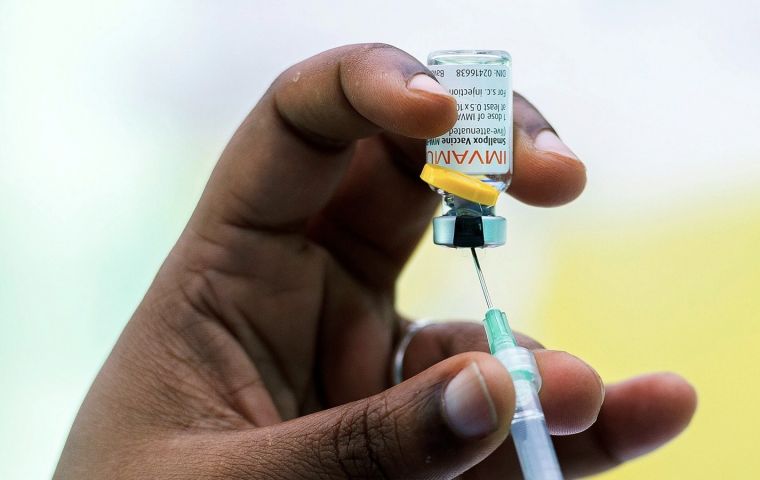MercoPress. South Atlantic News Agency
Monkeypox a global emergency, WHO declares
 Vaccination for people at risk is recommended but large-scale campaigns have been advised against at this time
Vaccination for people at risk is recommended but large-scale campaigns have been advised against at this time The World Health Organization (WHO) declared that the onset of monkeypox constituted a global emergency after cases of the malady were detected in over 70 countries.
“In light of the evolving #monkeypox outbreak with over 16,000 reported cases from 75 countries & territories, I reconvened the emergency committee. Based on the Intl. Health Regulations criteria, I decided to declare this outbreak a Public Health Emergency of Intl. Concern,” WHO Director Tedros Adhanom Ghebreyesus said through his Twitter account @DrTedros Saturday.
The U.N. health agency's declaration puts monkeypox in the same category as the Covid-19 pandemic, which could lead to a shortage of vaccines, it was reported. There are now more than 16,000 cases of monkeypox outside Africa, about five times the number when advisers met in June and declined to formally declare it a public health emergency.
The increase in cases prompted the organization to reconvene an emergency committee.
“We have an outbreak that has spread rapidly around the world through new modes of transmission, about which we know very little,” Tedros said. “While I am declaring a public health emergency of international concern at the moment, this is an outbreak that is concentrated among men who have sex with men, especially those with multiple sex partners,” he added. “That means this is an outbreak that can be stopped with the right strategies in the right groups.”
A study published last week in the New England Journal of Medicine reported that in 95% of recent cases, the disease was transmitted by sexual contact and that 98% of those affected were gay or bisexual men. The escalating outbreak has also prompted the U.S. Department of Health and Human Services to order 2.5 million additional doses of vaccine.
The WHO's announcement came after at least 16,000 cases were reported worldwide, including 5 deaths in Africa.
Tedros highlighted that there was necessary to increase international vigilance and develop public health measures to identify new cases. “The risk of monkeypox is moderate globally, except in the European region, where it is high.”
A health emergency is the highest level of alert foreseen by the International Health Regulations, a consideration that until now only COVID-19 and polio have had. The measure confers international powers on the WHO through recommendations that will be binding on member countries.
To combat the monkeypox outbreak, WHO recommends the following measures to countries: implement a coordinated response to stop transmission and protect vulnerable groups; intensify surveillance and public health measures; strengthen clinical management and infection prevention and control in hospitals and clinics; and accelerate research on the use of vaccines, therapies, and other tools.
Monkeypox is a zoonotic viral infection, which can be transmitted from animals to humans and also among people through close contact with someone who has a monkeypox rash. By “close contact” the WHO means face-to-face, skin-to-skin, mouth-to-mouth, mouth-to-skin, or even sexual contact.
While most cases have been detected among men who have sex with men, Tedros insisted that “stigma and discrimination can be as dangerous as any virus.”
The most common symptoms of monkeypox are fever, headache, muscle or back pain, swollen glands, and fatigue. Between 1 and 5 days later, a rash is added to the skin, which goes through different stages until it forms a crust that then falls off. In most cases, these symptoms disappear on their own within a few weeks. However, in some people, the infection can lead to medical complications and even death. Mortality described in outbreaks in Africa varies from 1 to 10 %.
There is a vaccine that was developed for simian smallpox (MVA-BN), which was approved in 2019. Some countries, such as the United States, recommend vaccination for people at risk but mass vaccination is not advised at this time.




Top Comments
Disclaimer & comment rulesCommenting for this story is now closed.
If you have a Facebook account, become a fan and comment on our Facebook Page!